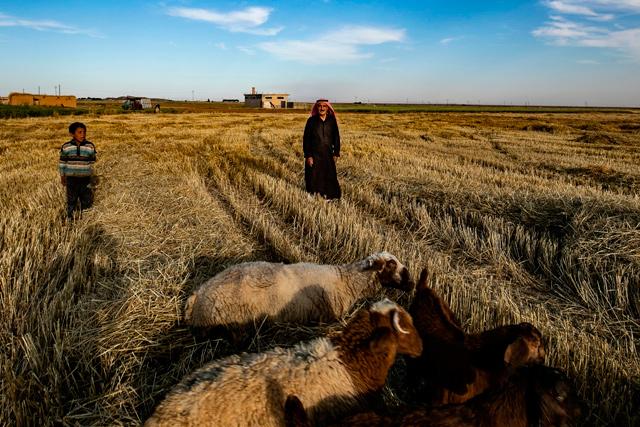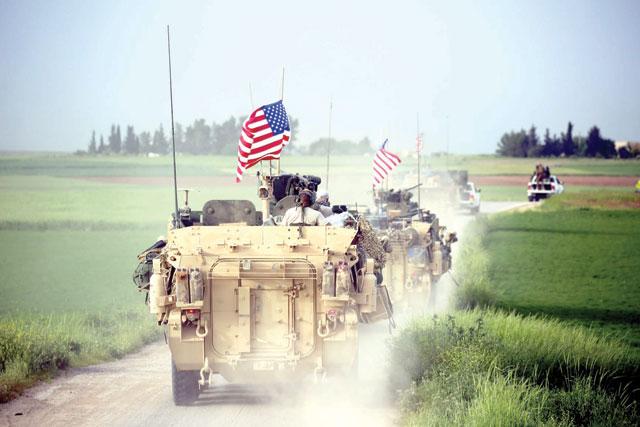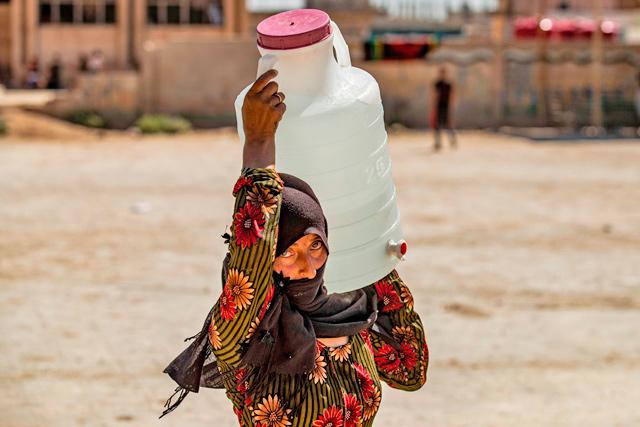You are here
In Syria’s breadbasket, Kurds and regime battle for wheat
By AFP - Jun 11,2019 - Last updated at Jun 11,2019

A photo taken on May 21 shows a farmer and his goats in a field in Syria's north-eastern region of Hasakeh (AFP photo)
AMUDA, Syria — Gazing over his wheat field in north-eastern Syria, farmer Adel Othman expects a bumper crop this year, but two rival authorities squabbling over his harvest have dashed his enthusiasm.
After successive droughts and eight years of civil war, both the local Kurdish authorities and the Damascus regime are desperate to buy up his region's produce to feed their people and maintain the peace.
In a country where millions depend on bread as a staple food to survive, both want the wheat grown in the country's north-eastern breadbasket region of Hasakeh.
Farmers in the Kurdish-held region like Othman have been caught up in the middle, with only two potential buyers, neither offering a satisfactory price.
Our "livelihood should not be transformed into a political bargaining chip", said the 55-year-old, his sky-blue shirt streaked in places with dry earth.
The regime is offering a better price, but the Kurds have said no wheat can leave the region under their control.
"We'll sell our crop to the highest bidder," Othman said in Kurdish by his field in the area of Amuda.
"In the end, a farmer needs to make a profit," he said, his short black hair slightly unruly above a thick moustache.
Farmers are especially eager to sell their crop to make up for poor harvests in previous years, but also to save them from fires — some claimed by Daesh — that have ravaged fields in the region.
'Food crisis'
Syria's Kurds have largely stayed out of the eight-year civil war, instead setting up their own institutions in areas under their control.
But they did lead the US-backed fight against Daesh in Syria, and are now hoping that will give them leverage in retaining a degree of autonomy in the northeast.
"The Kurds do not want to let wheat out because the production is barely enough to feed the local population," Syria expert Fabrice Balanche said.
"If the wheat went off to Damascus because of the higher price, it would cause a food crisis," he added.
According to the World Food Programme, 6.5 million people in Syria are "food insecure", or do not know where their next meal is coming from.
This year Syria is anticipating an ample crop yield after abundant rain, following a wheat harvest last year that was the worst since 1989.
The Syrian government is expecting 850,000 tonnes of wheat from Hasakeh.
The head of the Damascus government's agriculture office in Hasakeh, Amer Sello, told AFP he expected to snap up most of the province's harvest.
"Government cereal reception centres will see growers flock because of the attractive prices," he said.
The Kurds last month increased their buying price for a kilogramme of wheat from 150 to 160 Syrian pounds ($0.37), but that is still not enough to compete with the regime's offered 185.
The Kurdish grain authority chief, Salman Bardo, accused the regime of announcing its higher price "to sow discord between the people and the autonomous administration".
The Kurds would not permit the regime to ferry the cereal to other parts of Syria, he said.
"We will not allow it to leave north-east Syria," he added, without providing further details on how this would be achieved.
‘Wheat weapon’
After successive Russia-backed victories against rebels and terrorists since 2015, President Bashar Assad's regime today controls some 60 per cent of the country.
But Syrians in these areas are struggling to get by in an economy ravaged by war, as well as facing fuel shortages the regime blames on international sanctions.
"Assad needs access to cereal crops in northeast Syria to prevent a bread crisis in the areas of western Syria that he controls," Syria analyst Nicholas Heras said.
But in the almost 30 per cent of the country they control, the Kurds and their US ally also need to cling on to the wheat as a trump card in ongoing negotiations.
Damascus and the Kurds have started talks to discuss the future of the northeast, but so far without success.
At a national level, endless rounds of UN-brokered peace talks have also failed to end the war.
"Wheat is a weapon of great power in this next phase of the Syrian conflict," Heras said.
And the Kurds and their US ally "have a significant stockpile of this wheat weapon", Heras said.
Related Articles
QAMISHLI, Syria — Syria's Kurds fear the steadfast ally they found in the US to successfully take on the Daesh terror group militants may no
HASAKEH, Syria — Outside her home in northeast Syria, Sheikha Majid said her life had become an endless quest for fresh water, three weeks i
BEIRUT — The Daesh terror group may have lost its "caliphate", but three months later, experts have warned the extremists are still attackin

Opinion
Apr 09, 2025
Apr 08, 2025
- Popular
- Rated
- Commented
Apr 08, 2025
Apr 09, 2025
Newsletter
Get top stories and blog posts emailed to you each day.
















